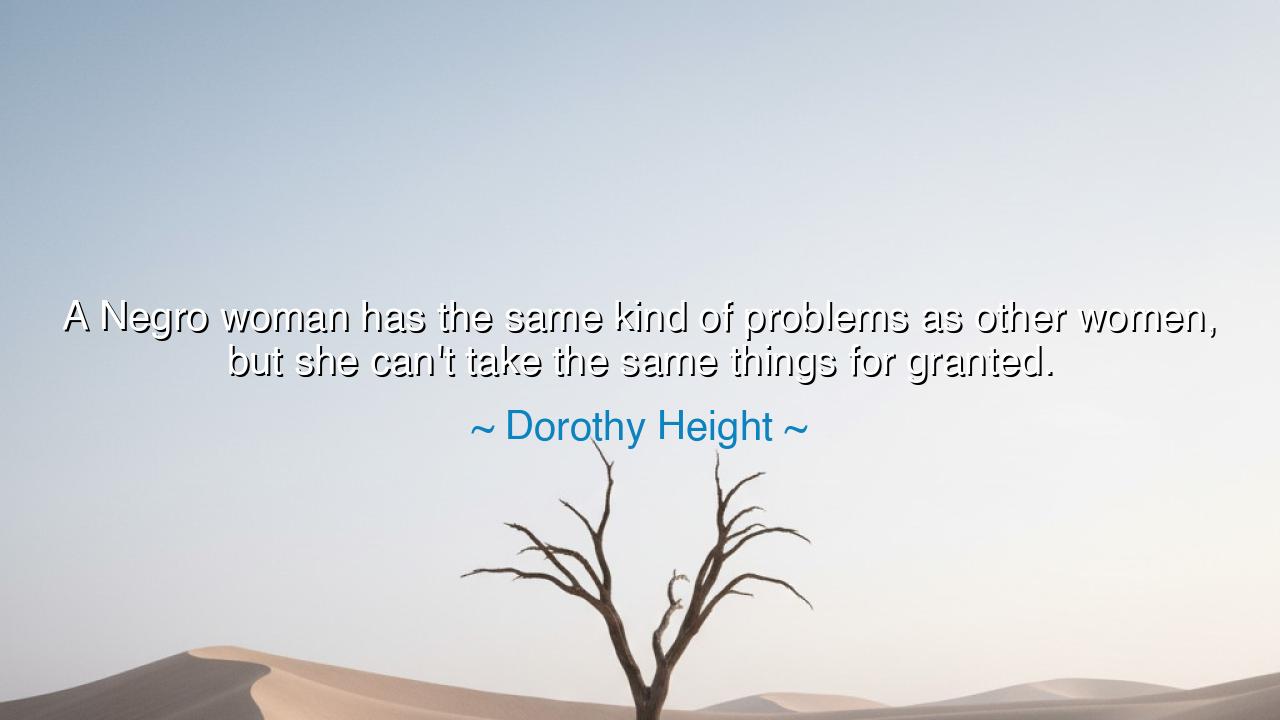
A Negro woman has the same kind of problems as other women, but
A Negro woman has the same kind of problems as other women, but she can't take the same things for granted.






Hear, O children of justice, the steadfast words of Dorothy Height: “A Negro woman has the same kind of problems as other women, but she can’t take the same things for granted.” In these words lies the sorrow and the strength of the Black woman, who carries not only the burdens of womanhood but also the chains of racial injustice. Where other women struggle, she too struggles, yet her road is made heavier by barriers others do not see, by rights denied, and by freedoms withheld.
For all women wrestle with questions of equality, dignity, and opportunity. Yet the Negro woman of Height’s time faced a double weight: sexism on one side, racism on the other. She could not assume that her labor would be valued, her safety defended, or her voice heard in the same way as white women’s voices. What others might take as a given—fair pay, protection under the law, or even respect in daily life—she had to fight for, often without allies.
History offers many proofs. During the civil rights movement, Black women stood in the streets, marched, and organized alongside men. They also fought for the recognition of their role within the wider women’s movement, which too often overlooked them. While white women campaigned for equality in the workplace or the vote, Black women were already laboring as maids, cooks, and nurses—bearing responsibilities without ever being granted the privileges their sisters demanded.
Consider also Sojourner Truth, who stood before a crowd in 1851 and declared, “Ain’t I a Woman?” In that cry was the same spirit Height later voiced: the demand to be recognized as fully woman, fully human, despite the color of her skin. Truth, like Height, revealed the painful reality that Black women were denied what others assumed without question. Their lives were testimony to resilience in the face of compounded injustice.
Therefore, O seekers of understanding, let this be your teaching: justice is never whole when it leaves some behind. To honor the struggles of women, one must also honor the struggles of Black women, who carry not only the common burdens of their sex but also the sharpened edge of racial oppression. Height’s words endure as both lament and command: do not forget those who cannot take for granted what others call simple rights, for in their struggle lies the truest measure of freedom.






2N23. Ngoc
Dorothy Height’s reflection on the additional burdens Black women face within the broader context of women’s issues highlights the complexity of intersectional oppression. Women of color don’t just face the typical challenges of womanhood but must also confront systemic racism. How do we elevate these conversations in spaces dominated by white feminism, and how can we support Black women’s voices in a way that is not just symbolic but transformative in addressing both race and gender discrimination?
TTHuynh Truong thanh
Height’s insight sheds light on the compounded discrimination faced by Black women. It makes me wonder how often their unique challenges are overlooked in conversations about gender equality. What does it mean to acknowledge the intersection of race and gender, and how can we ensure that women of color don’t feel excluded from both the feminist movement and racial justice efforts? This quote really makes me think about the importance of inclusivity and recognition in activism.
NHNguyen Helena
Dorothy Height’s words really resonate with the concept of intersectionality. It’s not just about being a woman, but about how race and other factors amplify the challenges one faces. Black women, for example, often have to navigate the world differently due to systemic racism. How do we ensure that their voices are heard within the broader women’s movement? Shouldn’t the fight for equality also address these unique burdens?
KTTruong Thi Kim Trinh
Height’s statement is a poignant reminder that women’s issues cannot be generalized across all women, especially when race and other factors come into play. Black women’s struggles are shaped by both sexism and racism, and these combined forms of discrimination make their experiences different. How do we create a more inclusive feminist movement that acknowledges the specific challenges faced by women of color without losing sight of the common ground shared by all women?
QLNhu Quynh Le
Dorothy Height’s quote speaks to the layered complexities faced by Black women. It highlights how racial inequality compounds the challenges that women face universally. While all women share similar struggles, the added barriers for Black women cannot be ignored. How do we reconcile the unique obstacles they face with the broader fight for gender equality? Can mainstream feminism truly address these intersectional issues, or does it overlook the experiences of women of color?